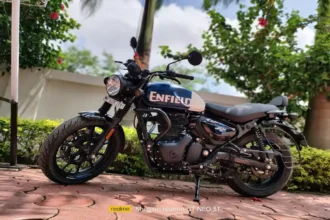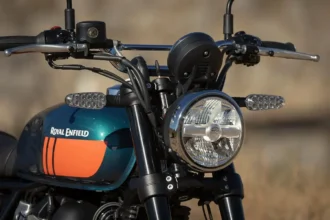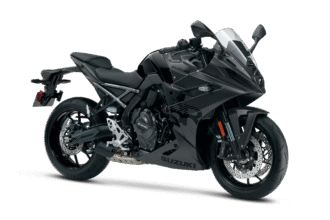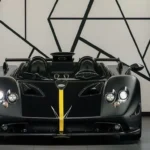The Ducati Streetfighter V4 stands as one of the most exciting naked superbikes to hit the market in recent years. Born from the legendary Panigale V4 platform, this Italian beauty strips away the fairing while keeping every ounce of raw performance and character. When you first see the Streetfighter V4, the aggressive lines and muscular stance immediately signal that you are looking at something special, something that means business.
The naked bike segment has evolved dramatically over the years. From humble beginnings in the 1980s and 1990s with bikes that were essentially faired sportbikes without fairings, today’s hypernaked category represents the pinnacle of engineering and design. The Streetfighter V4 is proof that manufacturers can now create naked motorcycles that match or exceed their fully-faired counterparts in terms of technology, performance, and sheer ridership thrills. This bike represents a significant shift in what riders can expect from a raw, exposed superbike platform.
Riding the Ducati Streetfighter V4 for the first time is an experience that stays with you. The moment you twist the throttle and feel all 214 horsepower surge through the chassis, there is an undeniable rush. The roar of the Desmosedici V4 engine combined with the direct wind in your face creates an intimate connection with the machine that fairing-equipped sportbikes simply cannot match. For riders seeking pure, unfiltered emotion on two wheels, the Streetfighter V4 delivers in spades.
Performance and IC Engine Capability: The Desmosedici Powerhouse
The heart of the Ducati Streetfighter V4 is the 1103cc Desmosedici Stradale engine, borrowed directly from the Panigale V4 but enhanced for even more character. This is not just any four-cylinder engine, it is a 90-degree V4 with MotoGP-derived Desmodromic valve timing. The Desmodromic system means that valves are mechanically opened and closed using camshafts rather than springs, allowing for incredibly aggressive cam profiles and high-rev stability. The engine spins to 13,500 rpm and beyond, a capability that immediately sets it apart from inline-four competitors.
The numbers tell part of the story. With 214 horsepower at 13,500 rpm and 120 Newton-meters of torque at 11,250 rpm, the Streetfighter V4 delivers impressive grunt across a wide powerband. What makes this engine truly special is its character. The counter-rotating crankshaft spins opposite to the wheels, reducing gyroscopic effects and improving turn-in agility. The unique firing order Ducati calls “Twin Pulse” gives the V4 a distinctive exhaust note that sounds like a MotoGP prototype. Twist the throttle past 9,000 rpm and the engine hits the afterburners, streaking down the road in a blur.
Throttle response is absolutely sharp. Whether riding in Sport or Race mode, the Ride-by-Wire system delivers immediate power with no delay or surprises. Low-down grunt is respectable, producing over 60 foot-pounds from just 3,500 rpm, making this bike surprisingly manageable during traffic crawls. Crack the throttle hard in any gear above 6,500 rpm and prepare for aggressive acceleration that will test your grip strength.
Acceleration figures tell the true story. The Ducati Streetfighter V4 launches from 0-60 mph in just 2.97 seconds and reaches 0-100 km/h in 3.14 seconds. Quarter-mile times hover around 10.2 seconds at 149 mph. These numbers rival some dedicated drag bikes, yet this is a road-going naked motorcycle. High-speed manners are composed and stable thanks to electronic assists and the refined chassis.
The cooling system received significant improvements for 2025. Water radiator cooling area increased by 17 percent, while the oil cooler benefits from a race-derived dual-flow circulation layout. This means the Ducati Streetfighter V4 maintains consistent performance even during extreme use or hot summer traffic. Fuel economy averages around 13.2 kilometers per liter during real-world riding, with a 16-liter fuel tank providing a theoretical range of approximately 210 kilometers on a full tank. Rider throttle control directly influences fuel consumption, with smooth riding yielding better economy than aggressive acceleration.
Vibrations are well-controlled thanks to the 90-degree V4 layout and counter-rotating crankshaft design. Engine vibration at idle is present but manageable, while at cruise speeds and above, refinement improves considerably. Road vibration transmitted through the bars and pegs comes more from the exposed nature of the bike rather than engine vibration itself.
The sound is absolutely intoxicating. The underslung dual exhaust pipes emit a purposeful, aggressive tone that rises from a subtle growl at low revs to a proper V4 symphony at 10,000-plus rpm. It is the kind of sound that turns heads and makes even casual observers pause and listen. Factory titanium Akrapovic exhaust upgrades are available for those seeking even more acoustic theater and additional power.
Design, Comfort, and Style: Raw Beauty Meets Practicality
From the moment you lay eyes on the Ducati Streetfighter V4, the design strikes an emotional chord. The front-end styling is purposeful and aggressive, dominated by a new full-LED headlight with a distinctive light signature that sets it apart from competitors. The twin circular daytime running lights create an intense, focused stare that somehow communicates the bike is ready for anything.
The bodywork maintains true Streetfighter DNA while incorporating proportions borrowed from the Panigale V4. The narrow tank features a distinctive shoulder that flows into a more prominent rear section. The seat sits lower than the 2024 model year, improving accessibility for shorter riders while maintaining the aggressive stance. A single-seat configuration with a removable passenger cover gives the bike a track-focused appearance, though a two-seat version is available.
The frame is a lightweight aluminum alloy construction that keeps the Ducati Streetfighter V4 at just 199 kg kerb weight with fuel. This incredible power-to-weight ratio of 0.49 hp per pound gives the bike light, responsive handling that belies its serious performance. The new Ducati Hollow Symmetrical double-sided swingarm improves traction during acceleration and cornering, reducing lateral stiffness by 43 percent compared to the previous single-sided design.
Riding position represents a careful balance between sportiness and real-world comfort. The seating position is derived from the Panigale V4 but specifically adjusted to improve accessibility, particularly for taller riders. The seat-tank unit offers greater longitudinal freedom, allowing riders to move forward on the seat for a more aggressive position or sit further back for touring. The tankpad offers good grip without being abrasive.
Handlebar placement sits 10 millimeters closer to the rider compared to the previous generation, while footpegs are 10 millimeters forward and inward. These subtle changes dramatically improve comfort without sacrificing ground clearance. The seat itself measures 845 millimeters high, accessible for many riders of varying heights, though Ducati offers optional lower-seat variants for those who prefer even easier ground contact.
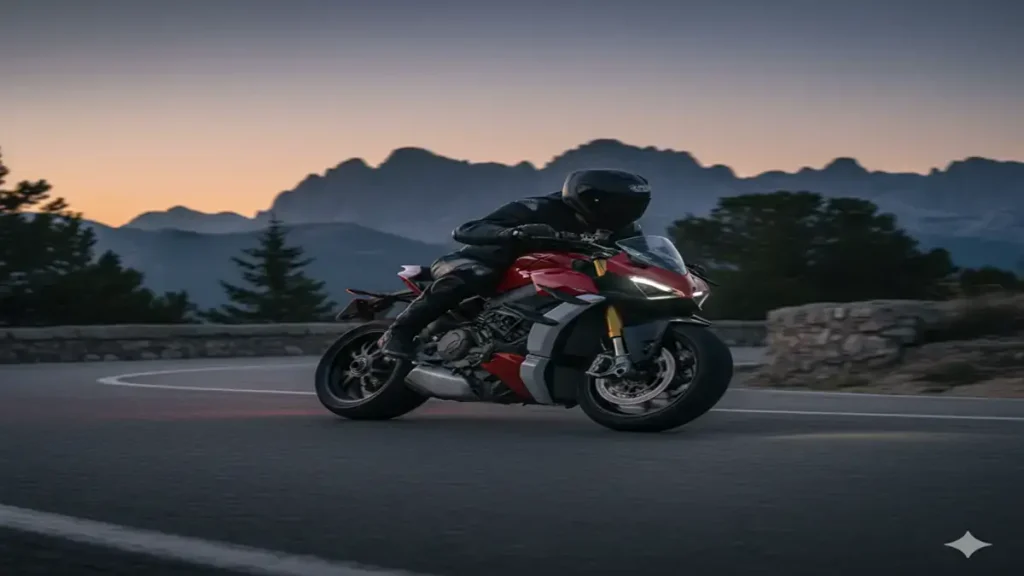
The riding position is definitely aggressive, with the upper body tucked down in a semi-recumbent sport stance. Long straights and highway cruising require core strength and arms will fatigue before legs on extended highway missions. However, town riding is surprisingly manageable, and the Streetfighter V4 never feels unwieldy despite its performance credentials.
Seat comfort on the stock unit is adequate for 30-45 minute stints before pressure becomes noticeable. Ducati Performance offers several seat options including sport, low-rider, and racing variants, each with different height, firmness, and grip characteristics. Aftermarket alternatives from brands like Sargent and Corbin provide comfortable solutions for longer rides.
Thermal management improved dramatically for 2025 thanks to refined cooling systems and air management. Heat output at idle is present but not overbearing, improved from earlier V4 models. Two cooling ducts integrated into the side panels direct hot air away from the rider’s legs during traffic. Riding at speed provides excellent heat dissipation. Riders familiar with earlier Panigale or Streetfighter models will immediately notice the improved thermal comfort.
The overall build quality feels premium. Finish on painted surfaces is excellent with deep color saturation and a proper paint depth that resists scratching and minor rock chips better than some competitors. Trim pieces appear robust, and the overall assembly quality reflects Ducati’s Audi ownership and manufacturing improvements over recent years.
Features and Technology: Electronic Sophistication
The Ducati Streetfighter V4 S variant comes loaded with cutting-edge electronics that rival superbikes and even some adventure bikes in complexity. The centerpiece is a 6.9-inch TFT color touchscreen with full connectivity capabilities. The display offers two visualization modes, Road and Track, allowing riders to customize information presentation based on riding situation. The Track mode features a rev counter bar stretching across the screen width, crucial for focused track riding.
Riding modes include Road, Sport, Race, and Wet. Each mode adjusts engine mapping, ABS sensitivity, traction control intervention, and suspension behavior. Road mode offers smooth power delivery with conservative electronics, perfect for commuting or learning. Sport mode cranks up power while maintaining traction control at moderate levels. Race mode unleashes full power with minimal interference, designed for track work or experienced riders on open roads. Wet mode reduces power and adjusts braking and traction settings for rain conditions.
Power modes offer four levels of throttle response, labeled Full, High, Medium, and Low. This provides an extra layer of customization beyond riding modes. Combined with riding modes, this creates highly tuned experiences for different conditions. A rider could select Sport riding mode with Medium power for canyon driving, then switch to Race mode with Full power for track days.
Cornering ABS EVO represents Ducati’s latest anti-lock braking technology, incorporating a six-axis inertial measurement unit that understands lean angle, acceleration, deceleration, and suspension movement. ABS operation is smooth and intuitive during emergency stops, with proper feel feedback through the brake lever. ABS can be partially disabled or adjusted per riding mode to suit rider preference.
Traction control in the form of Ducati Traction Control EVO 2 provides sophisticated wheelie management and acceleration traction. Engine Brake Control EVO manages engine braking effect, Slide Control manages rear wheel slip, and Wheelie Control Evo actively prevents front wheel lift. These systems are sophisticated enough to be transparent during smooth riding but provide safety nets when things get chaotic.
Quick shifter functionality includes both upshift and downshift capabilities. Upshifts are lightning-fast with minimal power interruption. Downshifts employ rev-matching to smooth engine braking, making rapid gear changes smooth even under hard braking. Quick shifter operation is intuitive and becomes second nature after short familiarity.
Ducati Multimedia System integration allows smartphone connectivity for calls, messages, and music control. Navigation integration is available through compatible phone apps. Full LED lighting with adaptive daytime running lights improves visibility and aesthetic appeal. Auto-off indicators return to off position automatically after turning, a quality-of-life feature that prevents left-on turn signals.
Ducati Vehicle Observer gathers comprehensive data about your riding. Combined with Ducati Data Analyzer Plus, riders can review lap times, acceleration data, braking distances, lean angle, throttle position, and countless other metrics to improve riding technique or simply relive exciting moments.
Specifications Table: Technical Summary
| Specification | Value |
|---|---|
| Engine Type | Desmosedici Stradale 90° V4, liquid-cooled |
| Displacement | 1103 cc |
| Bore x Stroke | 81 x 53.5 mm |
| Valve Configuration | 4 desmodromic valves per cylinder |
| Compression Ratio | 14:1 |
| Max Power | 214 PS @ 13,500 rpm |
| Max Torque | 120 Nm @ 11,250 rpm |
| Fuel System | Electronic fuel injection, ride-by-wire |
| Transmission | 6-speed manual |
| Clutch | Hydraulically-controlled slipper wet multi-disc |
| Fuel Tank Capacity | 16 liters |
| Fuel Economy | 13.2 km/liter (real-world average) |
| Engine Oil Capacity | 3.2 liters |
| Cooling System | Liquid-cooled, enhanced 17% larger water radiator |
| Chassis | Aluminum alloy “Front Frame” |
| Frame Type | Aluminum double-sided swingarm (Hollow Symmetrical) |
| Dry Weight | 178 kg |
| Kerb Weight | 199 kg |
| Wheelbase | 1488 mm |
| Rake | 24.5° |
| Trail | 99 mm |
| Ground Clearance | 121 mm |
| Seat Height | 845 mm |
| Front Brake | Dual 330mm semi-floating discs, Brembo Monobloc Hypure 4-piston calipers with cornering ABS EVO |
| Rear Brake | 245mm disc, 2-piston caliper with cornering ABS EVO |
| Front Suspension | Öhlins NIX30 43mm fully adjustable fork, TiN-treated, Smart EC3 event-based damping |
| Rear Suspension | Öhlins TTX36 fully adjustable shock, Smart EC3 event-based damping |
| Front Tire | Pirelli Diablo Supercorsa SP V4 120/70 ZR17 |
| Rear Tire | Pirelli Diablo Supercorsa SP V4 200/60 ZR17 |
| Electronics | Cornering ABS EVO, Traction Control EVO 2, Wheelie Control, Slide Control, Engine Brake Control, Quick Shifter EVO 2 |
| Display | 6.9-inch TFT color touchscreen |
| Emission Standard | Euro 5+ compliant |
| CO2 Emissions | 165 g/km |
Competitor Comparison: How It Stacks Up
When evaluating the Ducati Streetfighter V4, three competitors immediately come to mind, the Kawasaki Z H2, BMW S1000R, and KTM 1290 Super Duke R.
Kawasaki Z H2: The supercharged Kawasaki produces 197 horsepower but delivers it with a completely different character. The H2’s strength lies in low-to-mid-range torque, with a supercharger providing instant response from any rpm. This makes the Kawasaki more usable in real-world riding despite slightly lower peak power. However, the Z H2 weighs significantly more at 527 pounds fully fueled compared to the Streetfighter V4 at 458 pounds. Handling advantages clearly favor the lighter Ducati, especially through corners where the Streetfighter feels nimble while the Kawasaki feels planted but heavy. Both bikes offer sophisticated electronics, though the Ducati provides a more immersive, connected riding experience. Price favors the Kawasaki slightly, though both represent premium purchases.
BMW S1000R: The BMW represents Bavarian engineering with a powerful 1000cc inline-four producing around 205 horsepower. The S1000R delivers refined, smooth power with exceptional electronics and long service intervals. However, the BMW lacks the emotional connection and raw character of the Ducati. The S1000R is perhaps better suited for riders seeking ultimate refinement and practicality over pure passion. Handling characteristics are excellent but perhaps less engaging than the Ducati’s more responsive nature.
KTM 1290 Super Duke R: The Austrian brand’s hypernaked produces approximately 180 horsepower from a twin-cylinder engine, significantly less than the Streetfighter. However, KTM’s lightweight aluminum frame and sophisticated electronics provide engaging handling. The KTM excels in real-world practicality with better wind protection as a true semi-faired design. For riders prioritizing everyday usability and lighter weight, the KTM offers compelling advantages, though the Streetfighter V4 dominates in raw performance and V4 character.
The Ducati Streetfighter V4 wins decisively in outright performance and emotional engagement. Competitors may offer advantages in specific areas like practicality, refinement, or value, but none match the combination of power, handling, technology, and visceral character delivered by the Ducati.
Ownership and Real World Experience: Living With The Beast
Purchasing the Ducati Streetfighter V4 means committing to premium pricing, but the experience justifies the investment for performance-focused riders. Fuel economy of 13.2 km/liter might sound modest, yet a 16-liter tank provides adequate range for meaningful riding explorations without constant refueling. Spirited riding reduces fuel economy to around 11-12 km/liter, while smooth cruising can yield 14-15 km/liter.
Reliability has improved dramatically since Audi ownership. The Ducati Streetfighter V4 platform has proven robust in real-world usage with owners reporting 7,000-plus miles without major issues. Desmodromic valve systems require no adjustment for 60,000 kilometers, a genuinely long interval that results in lower overall maintenance costs when calculated over time.
Regular maintenance costs are higher than Japanese competitors but reasonable for the performance level. First service at 1,000 kilometers runs approximately 50-60 dollars for oils and filters. Annual services thereafter cost around 50-70 dollars when performed by independent shops, more at Ducati dealers. The Desmo service at 60,000 kilometers involves valve clearance checking and typically costs 200-300 dollars depending on whether adjustment is needed.
Ride quality on the revised Ducati Streetfighter V4 represents a genuine improvement over earlier models. The new Öhlins Smart EC3 suspension features event-based electronic damping that adjusts damping on a stroke-by-stroke basis, optimizing comfort on rough surfaces while maintaining precision during aggressive riding. On typical road surfaces, the Streetfighter V4 absorbs imperfections admirably. Track riding reveals the suspension’s capabilities, with excellent support during corner entry and stability during acceleration.
Heat management improved considerably for 2025. Idle heat output, a historical weakness of the Panigale platform, is much more manageable thanks to improved cooling systems and redesigned cooling ducts. Traffic riding in summer heat is tolerable for 20-30 minute periods without excessive discomfort. Moving at highway speeds provides excellent heat dissipation due to the naked design and enhanced cooling.
Daily practicality requires realistic expectations. The Ducati Streetfighter V4 is a focused performance machine, not a comfortable commuter. The upright steering geometry and lightweight construction make the bike responsive and eager, excellent for spirited riding but potentially exhausting during extended highway commutes in stop-and-go traffic. The narrow tank and aggressive riding position limit fuel capacity and passenger comfort. Luggage carrying capacity is non-existent without expensive Ducati Performance accessories.
Chain maintenance is standard for any modern sportbike. O-ring chain inspection and lubrication should occur every 500 kilometers of aggressive riding or 1,000 kilometers of moderate riding. Tire wear depends heavily on riding style and conditions. Track-day tire wear can be dramatic, with supercorsa tires potentially lasting just 3,000-5,000 kilometers during aggressive riding. Street-only usage typically allows 8,000-12,000 kilometers per rear tire.
Brake maintenance is straightforward. Braided steel brake lines and high-quality Brembo components resist fade during normal riding and even moderate track use. Brake pads last 3,000-5,000 kilometers depending on riding intensity. Fluid replacement every two years maintains proper braking feel and safety margin.
The ownership experience is ultimately rewarding for riders who understand the Streetfighter V4’s purpose and limitations. This is a machine designed for weekend thrills, track days, and spirited canyon carving rather than practical transportation or luxury touring.
Useful Riding and Safety Tips: Maximizing Your Streetfighter Experience
Engine care for the Ducati Streetfighter V4 requires attention to fuel quality and oil condition. Always use premium fuel, minimum 95 RON, to avoid detonation and engine damage. The high 14:1 compression ratio demands quality fuel for optimal performance. Synthetic motor oil rated for wet-clutch motorcycles extends service intervals and protects the engine better than conventional oils.
Chain maintenance proves critical. A dry or dirty chain not only performs poorly but accelerates sprocket wear and potential catastrophic failure. Inspect the chain before every ride. Clean and lubricate the chain every 500 kilometers with a quality motorcycle-specific chain lube. Tension should be checked at the same interval, maintaining 30-40mm deflection at the midpoint between sprockets.
Brake system inspection should occur before extended riding. Fluid level checking is simple but crucial. Clear or light brown brake fluid indicates fresh, functioning fluid. Dark or black fluid suggests moisture contamination and requires immediate fluid replacement. Brake pad wear inspection is equally important. Visual inspection or thickness measurement ensures pads have adequate material remaining.
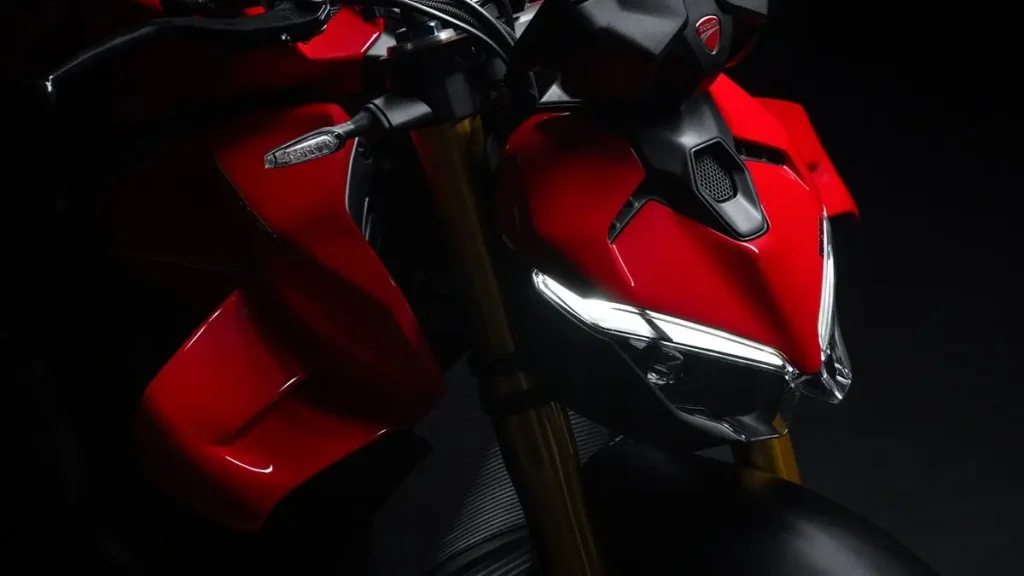
Tire pressure and condition directly impact safety and performance. The Ducati Streetfighter V4 requires 32 psi front and 36 psi rear (check specific placard on bike for manufacturer recommendations). Check pressure on cool tires before riding. Inspect tire sidewalls for damage or cracking. Look for adequate tread depth, aiming for 3mm minimum for road use and 4mm for track riding.
Long rides require mental and physical preparation. The aggressive riding position fatigues arms and core muscles during extended highway riding. Break every 60-90 minutes for stretching and repositioning. Hydration is crucial as the exposed riding position increases wind chill and dehydration risk. Invest in quality motorcycle gear including abrasion-resistant jacket, gloves, and protective pants.
Throttle modulation and smooth inputs prevent unnecessary wheelies and crashes. The Ducati Streetfighter V4 is eager to lift the front wheel under hard acceleration from lower gears. Control is learned through practice, gradually increasing throttle aggression as confidence builds. Electronic wheelie control provides an excellent safety net for learning.
Cold weather riding requires extra attention. The Ducati Streetfighter V4 offers no windscreen protection, meaning cold air assault is direct and unrelenting. Heated grips and bar risers help somewhat, but proper cold-weather gear is essential for maintaining dexterity and alertness.
Pricing and Market Status: Investment Analysis
The Ducati Streetfighter V4 carries premium pricing befitting its performance credentials and Italian engineering. In India, ex-showroom pricing starts at approximately 28,68,600 Indian Rupees for the base model, rising to 32,38,400 Rupees for the S variant with enhanced electronics and Öhlins suspension. On-road prices vary by city and taxation, ranging from approximately 30 lakhs to 36 lakhs depending on location and dealer charges.
Global pricing reflects the premium positioning. In the United States, the 2025 Ducati Streetfighter V4 S carries an MSRP of approximately 29,295 dollars. European pricing follows similar premium positioning. The V4 S variant justifies the cost premium through Öhlins electronic suspension, Brembo Monobloc calipers, forged wheels, and comprehensive electronics packages not available on the base model.
Current market demand remains strong despite the premium price point. The Ducati Streetfighter V4 represents a segment of buyers willing to prioritize performance and character over practicality and value. Used 2020-2023 models command strong prices, holding 60-70 percent of original purchase price after three years, indicating excellent residual value for performance bikes.
Variants are limited to two main offerings. The standard Ducati Streetfighter V4 provides adequate performance and technology for most riders. The S variant adds premium suspension components, wheels, and technology that genuinely improve the riding experience. For riders planning track days or seeking maximum adjustability, the S variant represents the better choice despite the premium.
2025 market updates include significant improvements over previous generations. Enhanced cooling systems, improved ergonomics for taller riders, electronic suspension refinements, and updated styling keep the Ducati Streetfighter V4 competitive against newer rivals. Ducati’s focus on track capability and everyday usability maintains relevance in an increasingly crowded hypernaked segment.
Conclusion: Is the Ducati Streetfighter V4 Worth Buying?
The Ducati Streetfighter V4 stands as a remarkable achievement in motorcycle engineering, delivering MotoGP-derived performance in a user-friendly naked package. The combination of 214 horsepower, sophisticated electronics, lightweight handling, and visceral character creates an unmatched experience in the hypernaked category. For riders who prioritize pure performance, emotional engagement, and riding thrills, the Ducati Streetfighter V4 deserves serious consideration.
This motorcycle shines brightest for enthusiasts who understand its strengths and limitations. Weekend canyon carving, track days, and spirited road riding reveal the Streetfighter V4’s true potential. It excels when ridden with intent and purpose rather than treated as a daily commuter or luxury tourer. The learning curve is moderate, with the bike rewarding progressively improved riding skills through better handling feedback and sharper body language.
Who should buy the Ducati Streetfighter V4? Experienced riders seeking maximum performance in a nakedly styled package will find genuine satisfaction. Intermediate riders ready to progress toward track days or advanced road riding will benefit from the intuitive electronics and forgiving chassis. Track enthusiasts will appreciate sophisticated suspension and electronics designed for circuit riding. First-time performance motorcycle buyers should approach cautiously, as the power delivery requires maturity and respect.
Who should look elsewhere? Casual riders seeking comfortable commuting will struggle with the aggressive ergonomics and loud character. Riders on tight budgets will find value-focused alternatives from Japanese and Korean brands offering lower entry prices. Riders prioritizing luggage capacity, wind protection, and luxury will find better solutions in adventure bikes or touring machines. Those uncomfortable with higher maintenance costs or premium service pricing may regret the commitment.
Verdict: A genuinely impressive naked superbike that delivers on every promise. The Ducati Streetfighter V4 represents the best of Italian performance engineering, marrying raw power with sophisticated technology and engaging character. It is not for everyone, but for the right rider with the right expectations, it is a transformative ownership experience that elevates every ride into something memorable and genuinely special.
Frequently Asked Questions About The Ducati Streetfighter V4
What is the real-world fuel economy of the Ducati Streetfighter V4?
Real-world fuel economy averages 12-14 kilometers per liter during normal riding, with conservative highway cruising potentially yielding 14-15 km/liter and aggressive track-focused riding dropping to 11-12 km/liter. The 16-liter fuel tank provides approximately 200-210 kilometers of range depending on riding intensity.
How does the Streetfighter V4 compare to the Panigale V4 it shares an engine with?
The Streetfighter V4 uses the same 1103cc Desmosedici Stradale engine as the Panigale V4 but with lower gearing for improved in-gear acceleration. The naked styling provides superior wind exposure and heat exposure compared to the faired Panigale. Handling characteristics are more approachable on the Streetfighter due to taller seating position and improved ergonomics.
Is the Ducati Streetfighter V4 suitable for track days?
Absolutely. The revised 2025 model specifically targets track capability with improved cooling, sophisticated Öhlins electronic suspension, cornering ABS, and track-focused electronics. Stock tires are track-capable though dedicated supercorsa tires optimize grip potential. Insurance typically requires modified policy for track use.
How often does the Streetfighter V4 require major service?
The famous Desmo service interval extends to 60,000 kilometers, an industry-leading interval that keeps long-term maintenance costs competitive with less powerful bikes despite premium hourly rates. Annual inspections and oil changes maintain health between major services.
What is the seat height and is it suitable for shorter riders?
Factory seat height measures 845 millimeters, accessible for most adult riders. Ducati Performance offers optional low-rider seats reducing height by 15mm for easier ground contact. Shorter riders may appreciate these alternatives or custom seat modifications from specialists.









